Editor's note: Pakistani post-doctoral student, with the help of Chinese mainland and Hong Kong experts, finds answer to improving people's livelihood in his homeland through agriculture. Xue Jingqi reports.
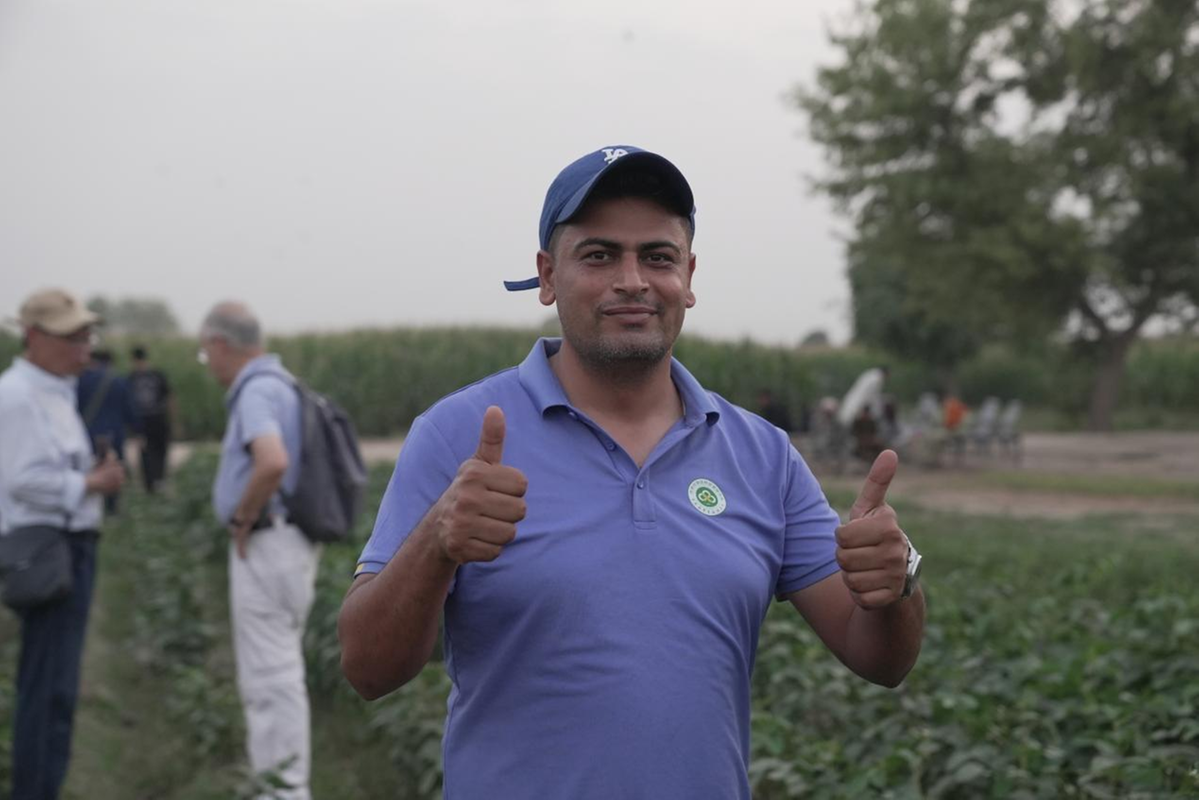
Hafiz Mamoon Rehman gives a thumbs-up in the soybean field. [Photo by Xue Jingqi/chinadaily.com.cn]
Hafiz Mamoon Rehman, born in a small village in Pakistan's Punjab province, grew up surrounded by golden wheat and cotton as white as snow. Unlike the generations before him who toiled the land, he chased academic excellence and sought knowledge beyond the familiar terrain of his homeland.
"Agriculture is food for poor countries," he says.
Rehman's journey led him to the fields of biotechnology, where he grappled with the intricacies of herbicide resistance and genetically modified wheat. In 2016, while pursuing his doctorate at Chonnam National University in South Korea, he chose soybeans as the subject of his long-term research.
He cast his resume into the world, reaching out to soybean experts across the globe. It was a message from Professor Lam Hon-ming of The Chinese University of Hong Kong's School of Life Sciences that set the stage for what was to come.
Lam, a prominent expert in agricultural science, had decoded the genomes of 31 soybean varieties, breeding non-genetically modified drought and salinity-tolerant germplasms, and was the first from Hong Kong to participate in a national-level space agricultural research project.
Two years later, Rehman joined Lam's lab, completing a successful three-year postdoctoral stint. Hong Kong became a dream for him, a place where he built up a family and memories, including the birth of his child at Prince of Wales Hospital.
Yet, despite the allure of the vibrant city, Rehman never lost sight of his goal – returning home and using his knowledge to help his people. "Hong Kong has a better life. But, I think if you really want to serve the farmer community, you should come to some agricultural country and serve."

Professor Iqrar Ahmad Khan, the Vice-Chancellor of University of Agriculture Faisalabad, made an exclusive interview with China Daily. [Photo by Tina Huang/chinadaily.com.cn[
Sowing Hope
After years of growth and learning, Rehman became a beacon of hope at the University of Agriculture Faisalabad, developing local soybean varieties suited for the conditions in Pakistan.
Pakistan, primarily an agrarian nation, faces challenges due to limited crop diversity and the adverse effects of climate change. With most of its agricultural land dedicated to five traditional crops and suffering from low soybean yield and quality, the country relies heavily on soybean imports for animal feed, unlike China's familiarity and consumption of soy products.
United Nations Secretary-General António Guterres labeled Pakistan as one of the countries most severely affected by climate change, a fact not lost on Rehman as he sought to introduce soybeans as a sustainable crop in his homeland.
Professor Iqrar Ahmad Khan — vice-chancellor of the University of Agriculture Faisalabad — explains that Pakistan spends up to two billion dollars annually importing around three 300,000 tons of soybeans. "What's important now is to bring in soybean as a mainstream green crop."
Achieving this goal meant finding the right seeds, and that's where Lam's expertise came into the picture. He had already cultivated the Longhuang series soybean in China's Gansu province, which is known for its high yield and quality even in arid and saline conditions.
In 2023, Lam, for the first time, visited Pakistan, taking with him a branch of seeds. Unlike the Long Huang series, what Lam prepared for Pakistan is genetically unstable soybean seeds, still undergoing change, with the hope of developing a variety that could thrive in the local environment.
In March this year, the news of a terror attack targeting a Chinese construction project in Pakistan's Cape province sent shockwaves across the globe. The incident raised serious concerns for Lam and his team's upcoming visit.
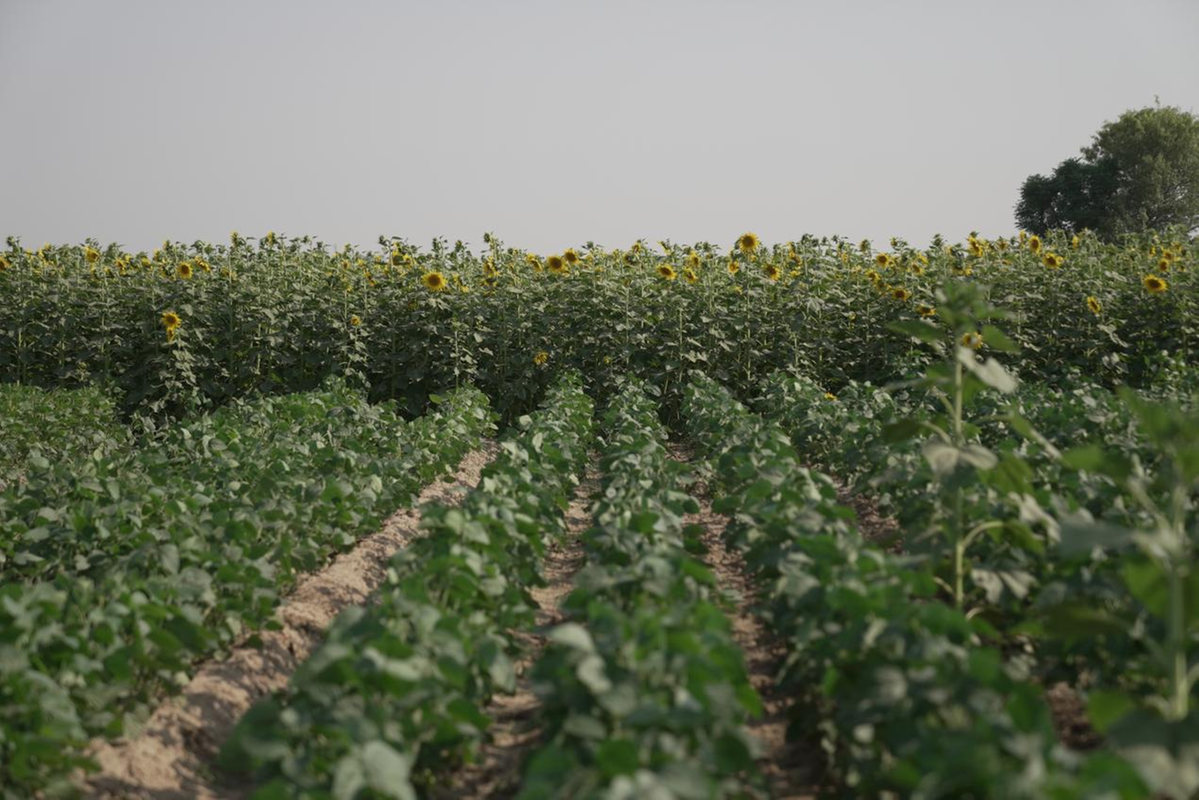
The soybean field intercropped with sunflowers. [Photo by Xue Jingqi/chinadaily.com.cn]
Departure and Arrival
Although the attack loomed large over the trip, members of Lam's team, including agricultural scientists, engineers and seed experts from Hong Kong and the Chinese mainland, alongside a group of Pakistani students from two Hong Kong middle schools, were not deterred, converging on Hong Kong International Airport in early May.
Lam said he hopes these students could observe their homeland from a different perspective and understand the connection between Hong Kong and Pakistan.
After a 10-hour flight and a layover, Lam and his team touched down in Lahore amid tight security. The trip, meant to be a straightforward agricultural exchange, now required navigating a complex security landscape.
Punjab, Pakistan's breadbasket, was the destination – a province with more than 100 million people and the most developed agricultural sector in the country.
"Introducing soybeans to Punjab is not an easy task," says Rehman, noting the crop's novelty to local farmers. In the following days, Rehman and Lam's team visited various villages, encountering soybean plots tucked away among cornfields, coriander, and winter melons, or nestled within vast sunflower expanses.
Zhang Guohong, a retired seasoned expert from Gansu Academy of Agricultural Sciences, bridged language barriers through his extensive agricultural knowledge, communicating with local farmers about irrigation, fertilization, and cultivation techniques.
The high temperatures of Punjab, edging close to 50 degrees Celsius, posed a significant challenge. "The extremely hot weather almost melted everything," Zhang says.
And, the resilient seeds provided by Lam sprouted, offering a glimmer of hope. "I used to give them seeds that were already stable. This year, I brought new seeds that are still changing. It's only by starting from a seed and struggling together that they can develop new varieties that truly belong there", says Lam.
As the Chinese saying goes — give people fish and you feed them for a day. Teach them how to fish and you feed them for a lifetime. Lam shared this Chinese philosophy through actions.
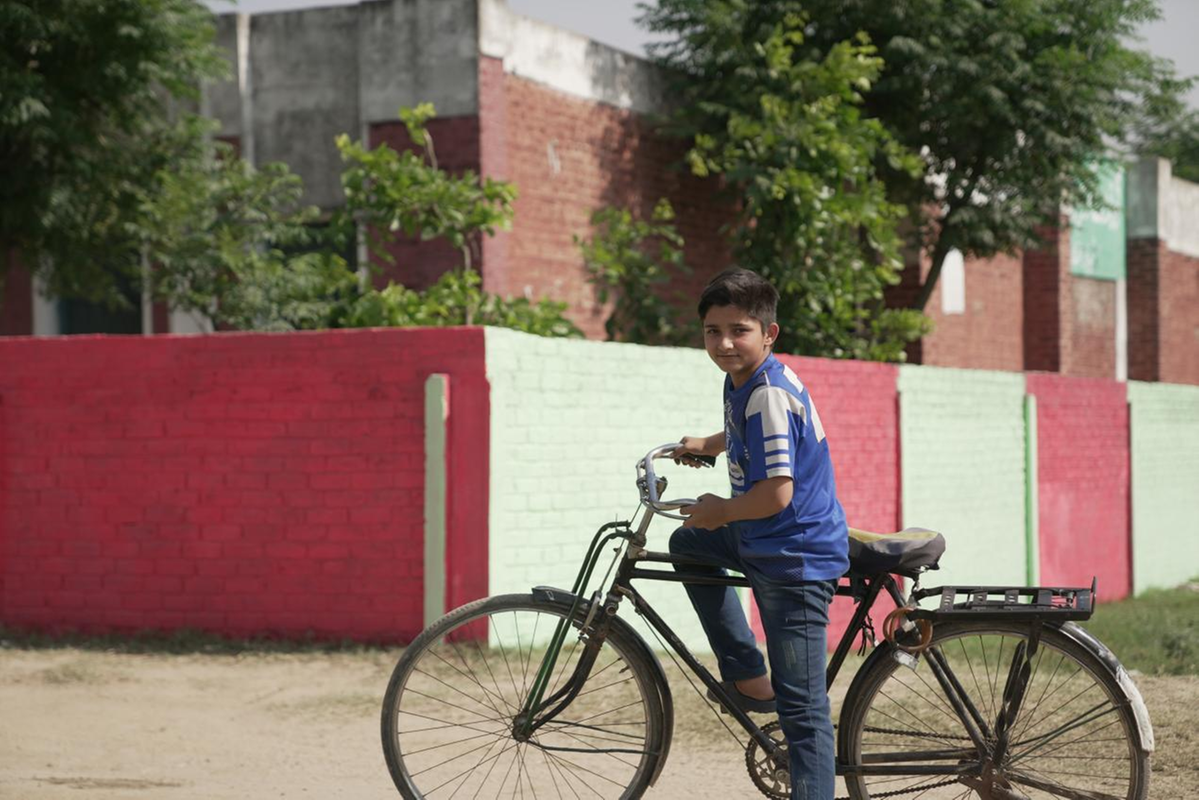
A 16-year-old Pakistani teenager. [Photo by Xue Jingqi/chinadaily.com.cn]
Backbone of Life
China, with only 9 percent of the world's arable land and 6 percent of its freshwater resources, has sustained nearly one-fifth of the global population.
Over the past 75 years, the average disposable income of rural residents has soared from mere single digits to impressive five-digit figures, and nearly 100 million rural inhabitants have lifted themselves out of poverty, achieving the United Nations' 2030 Agenda for Sustainable Development's poverty reduction targets a decade ahead of schedule.
Lam, as a 64-year-old agricultural scientist, has witnessed and contributed to the country's reforms and development in rural areas, saying China's experiences in rural revitalization in the past decade or so have provided valuable lessons for other developing countries.
Official data shows that China has dispatched over 2,000 agricultural experts and technicians to more than 70 countries and regions worldwide. These professionals have promoted over 1,500 agricultural techniques, advancing rural poverty alleviation, modern agricultural development, and increased income for farmers in Asia, Africa, the South Pacific, Latin America and the Caribbean.
At the University of Agriculture Faisalabad, Professor Iqrar Ahmad Khan points out that the institution has signed over 50 cooperation agreements with numerous Chinese universities and research institutions. By the end of last year, there were approximately 28,000 Pakistani students in China, forming one of the largest groups of foreign students in the country.
Rehman, of course, had strong ties with China as well. He showed the shirt he was wearing, saying it was a commemorative T-shirt given to him during a previous agricultural inspection in Hainan province, and had a Chinese logo printed on it.
And this time, the seeds from Hong Kong, China, did not disappoint him.
Approximately 3.5 hectares have been planted with soybeans that are anticipated to produce an impressive yield of 2,500 kilograms per hectare come summer. Additionally, Rehman witnessed a breakthrough three months into planting, with the soybeans segregating positively towards a locally adapted variety.
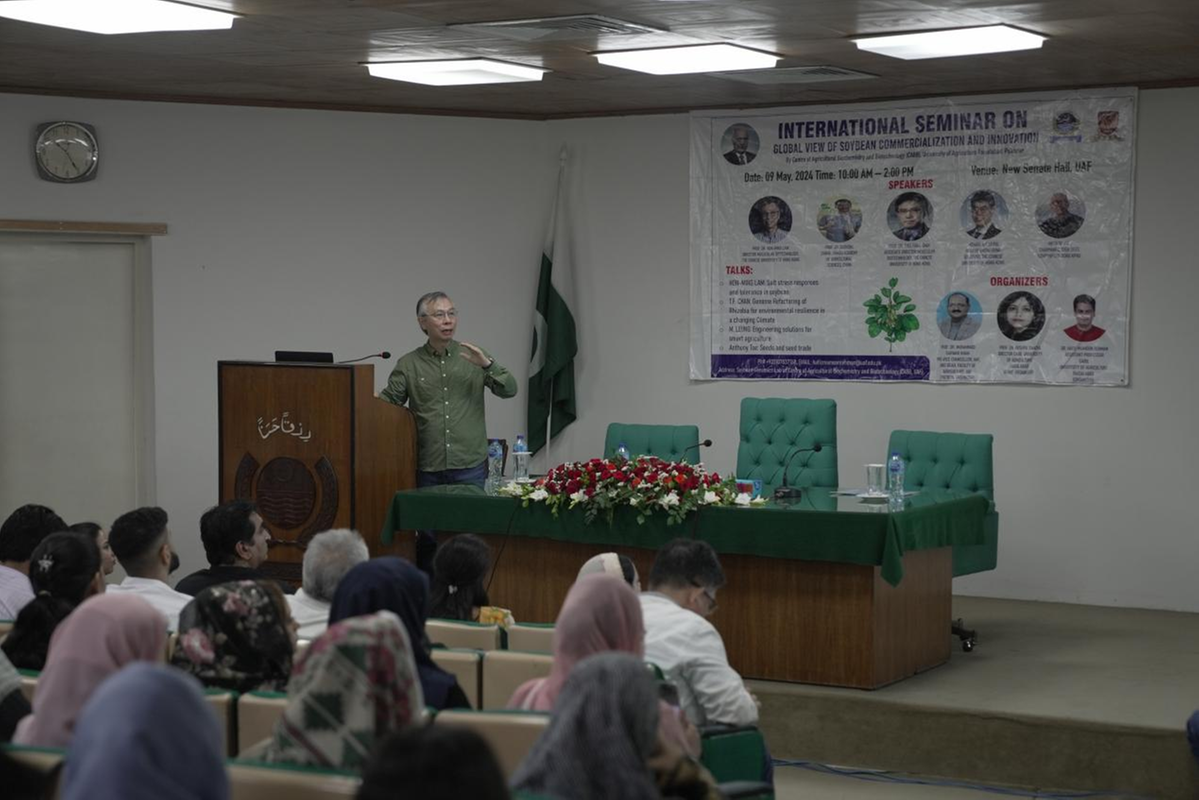
Professor Lam Hon-ming, director of the State Key Laboratory of Agrobiotechnology at the Chinese University of Hong Kong, made a speech at UAF in Pakistan. [Photo by Xue Jingqi/chinadaily.com.cn]
Lam's visit was more than an exchange of seeds. It was a transfer of knowledge and a gesture of friendship.
The collaboration between China and Pakistan in agricultural development highlighted the enduring bonds between the two nations, tracing back to the ancient Silk Road and flourishing under the modern Belt and Road Initiative.
"Building international friendships, connecting people at the grassroots level, and using science to help those in need have always been the core values of our Hong Kong team," says Lam. He emphasized the significance of sharing goodwill and friendship, especially as the country is celebrating the 75th anniversary of its founding this year.
Agriculture, at its core, is about nurturing life and sustaining communities. It's the embodiment of tireless work and the pursuit of innovations that can weather the storms of a changing world. For Lam and his team, it's about sharing the fruits of their labor, not just in China, but across the globe.
Their work continues beyond Pakistan, from developing drought-tolerant soybeans in South Africa to studying space-bred Longhuang seeds that traveled with the Shenzhou spacecraft. The soybean journey is just the beginning and, with it, the narrative of a burgeoning world of sustainable agriculture unfolds, a story that Lam and Rehman continue to write with each seed they plant.
"My kids are also living in the village, just like me. So, they would know how farmers grow food and how to help others," says Rehman.
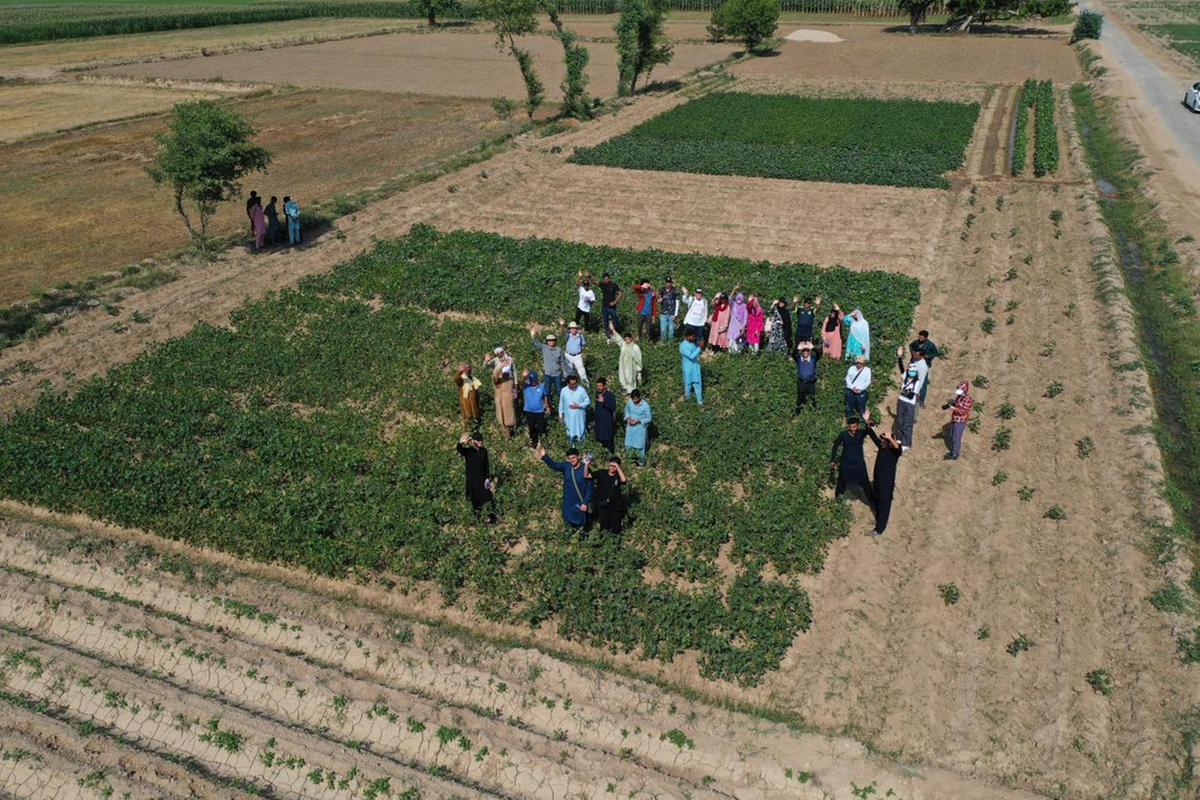
Professor Lam and Rehman's team visited different fields in Pakistan. [Photo provided to chinadaily.com.cn]
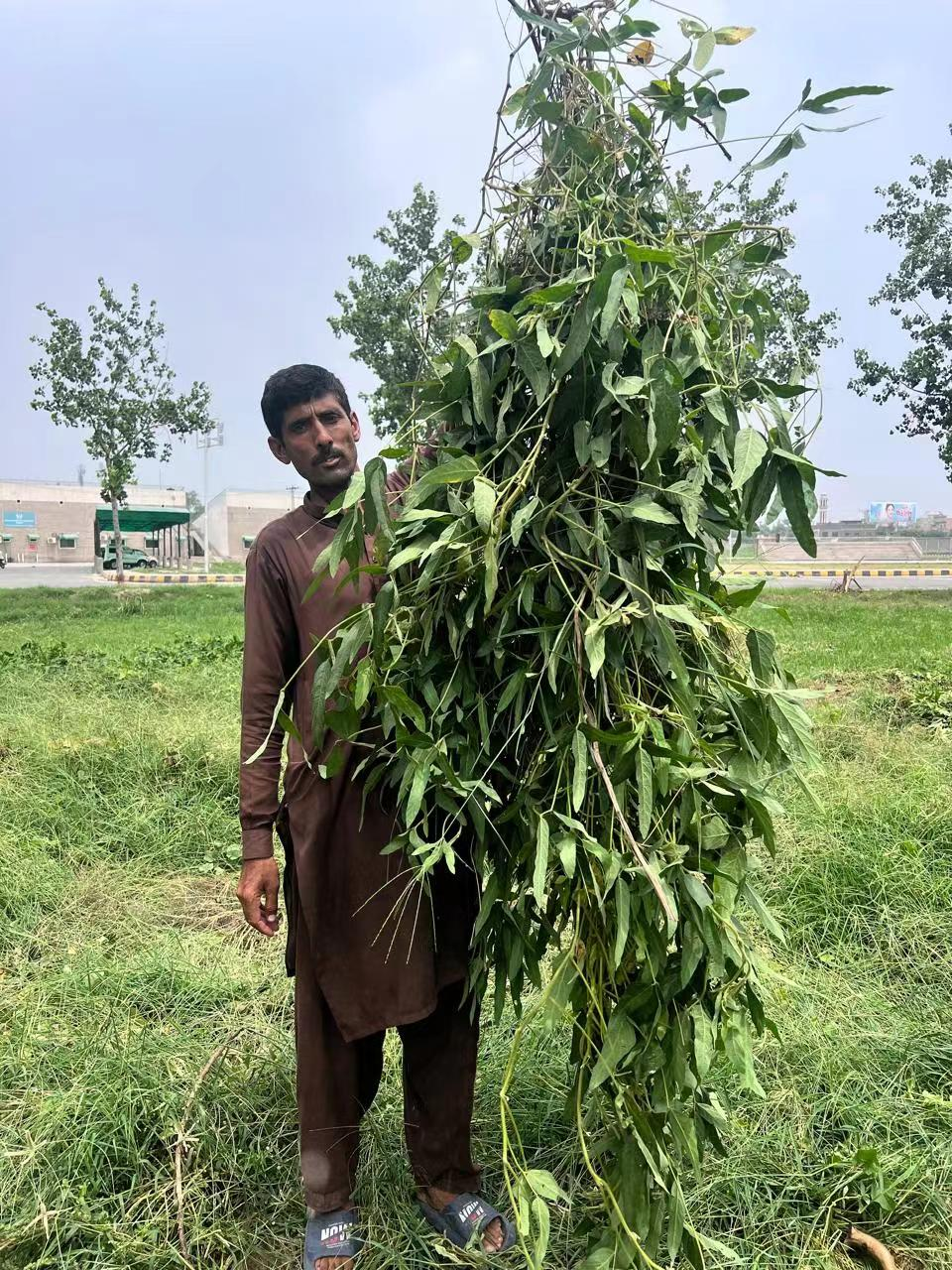
Local farmers reap a harvest after planting Chinese soybeans. [Photo provided to chinadaily.com.cn]
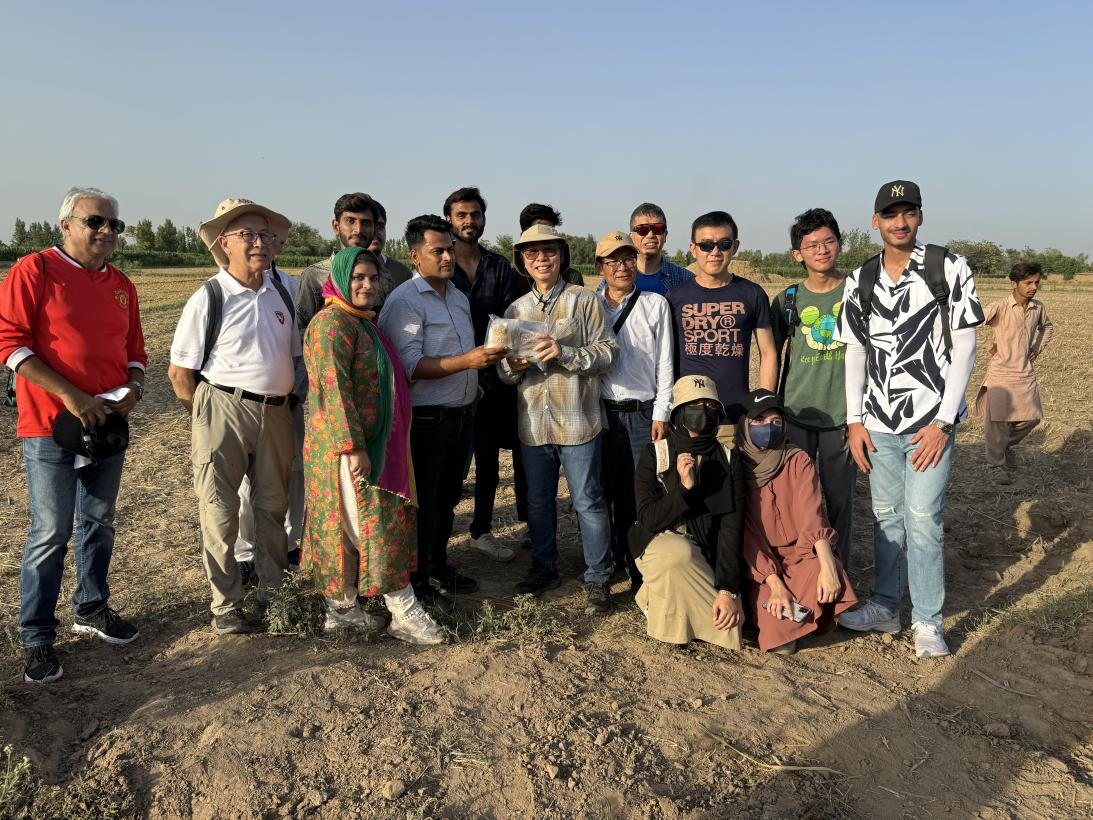
Professor Lam gave soybean seeds to the UAF team. [Photo provided to chinadaily.com.cn]